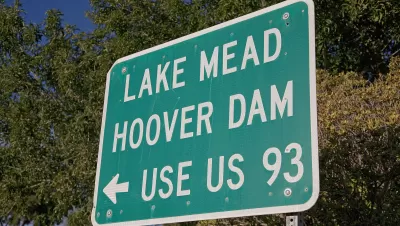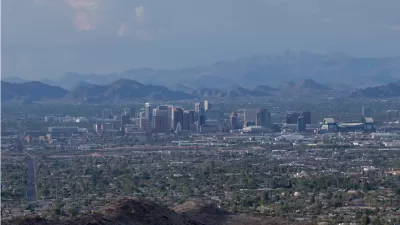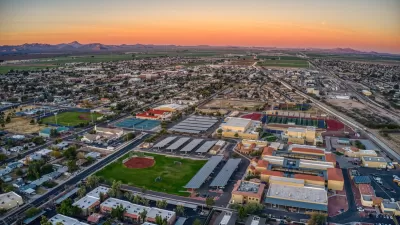As more and more people move to the suburbs blossoming in the Phoenix metro area, local water officials are increasingly concerned about the region's ability to keep up with demand.

Since before the pandemic, Phoenix has seen explosive growth as people seek out its affordable housing, warm climate, and work opportunities. But as Sarah Tory reports in High Country News, "[t]he region doesn’t appear to have enough water for all the planned growth."
Despite the looming threat of a dwindling water supply in the American Southwest, "people keep moving here — to the hottest, driest part of the country," Tory writes. The population of the Phoenix area is expected to grow to more than 7 million by 2040, with author and sociologist Andrew Ross calling it the "least sustainable city on earth." In addition to a small amount of groundwater and treated wastewater, "[m]ost of the valley’s water supply comes from the winter snowpack in distant mountains, which melts and flows through a vast system of dams, reservoirs and canals."
"A 2019 report published by the Kyl Center warns that in the long term there likely won’t be enough surface water available from the Central Arizona Project to replenish the groundwater used by all the homes currently planned for the Phoenix suburbs." The ambitious growth plans of many local cities pose serious questions about where future water supplies will come from. "Next year, water levels on Lake Mead, the largest reservoir on the Colorado River, are projected to drop to their lowest levels yet, triggering the first-ever official shortage declaration by the federal government. The declaration will cut Arizona’s Colorado River supplies by a fifth." As Tom Buschatzke, director of the Arizona Department of Water Resources put it, "[w]e’ll have to make some hard decisions."
FULL STORY: Rapid growth in Arizona’s suburbs bets against an uncertain water supply

Maui's Vacation Rental Debate Turns Ugly
Verbal attacks, misinformation campaigns and fistfights plague a high-stakes debate to convert thousands of vacation rentals into long-term housing.

Planetizen Federal Action Tracker
A weekly monitor of how Trump’s orders and actions are impacting planners and planning in America.

San Francisco Suspends Traffic Calming Amidst Record Deaths
Citing “a challenging fiscal landscape,” the city will cease the program on the heels of 42 traffic deaths, including 24 pedestrians.

Defunct Pittsburgh Power Plant to Become Residential Tower
A decommissioned steam heat plant will be redeveloped into almost 100 affordable housing units.

Trump Prompts Restructuring of Transportation Research Board in “Unprecedented Overreach”
The TRB has eliminated more than half of its committees including those focused on climate, equity, and cities.

Amtrak Rolls Out New Orleans to Alabama “Mardi Gras” Train
The new service will operate morning and evening departures between Mobile and New Orleans.
Urban Design for Planners 1: Software Tools
This six-course series explores essential urban design concepts using open source software and equips planners with the tools they need to participate fully in the urban design process.
Planning for Universal Design
Learn the tools for implementing Universal Design in planning regulations.
Heyer Gruel & Associates PA
JM Goldson LLC
Custer County Colorado
City of Camden Redevelopment Agency
City of Astoria
Transportation Research & Education Center (TREC) at Portland State University
Jefferson Parish Government
Camden Redevelopment Agency
City of Claremont





























